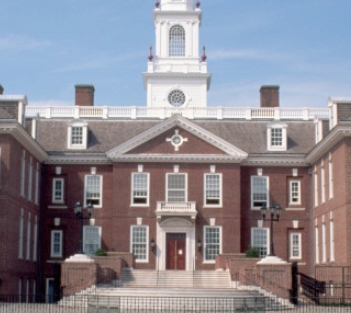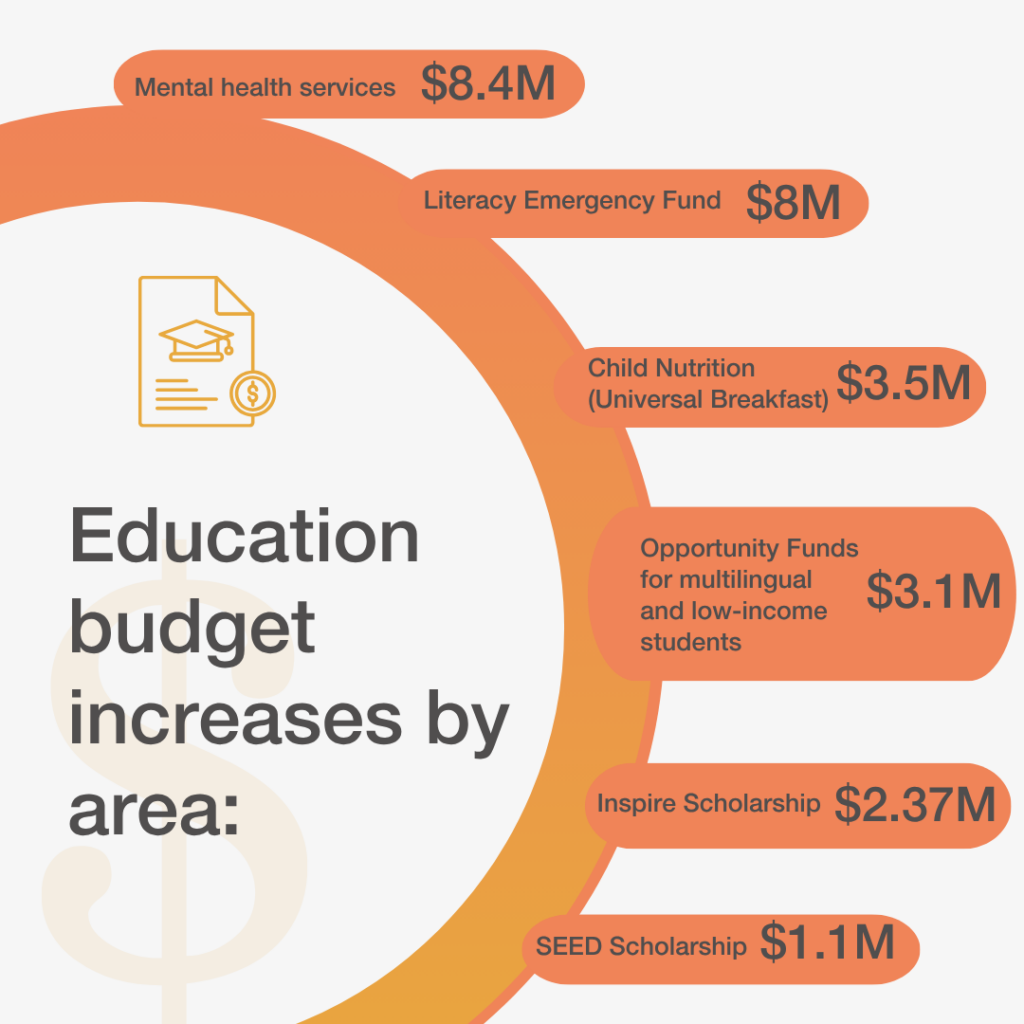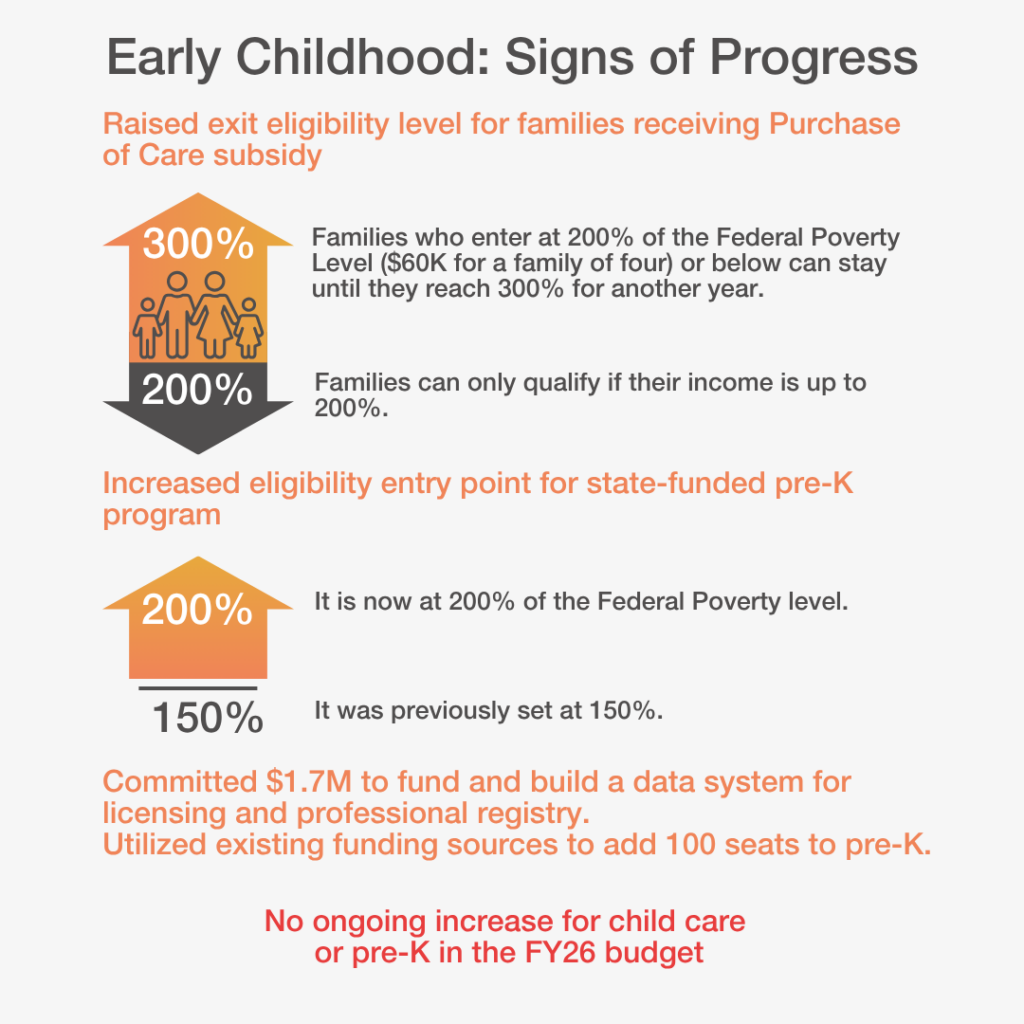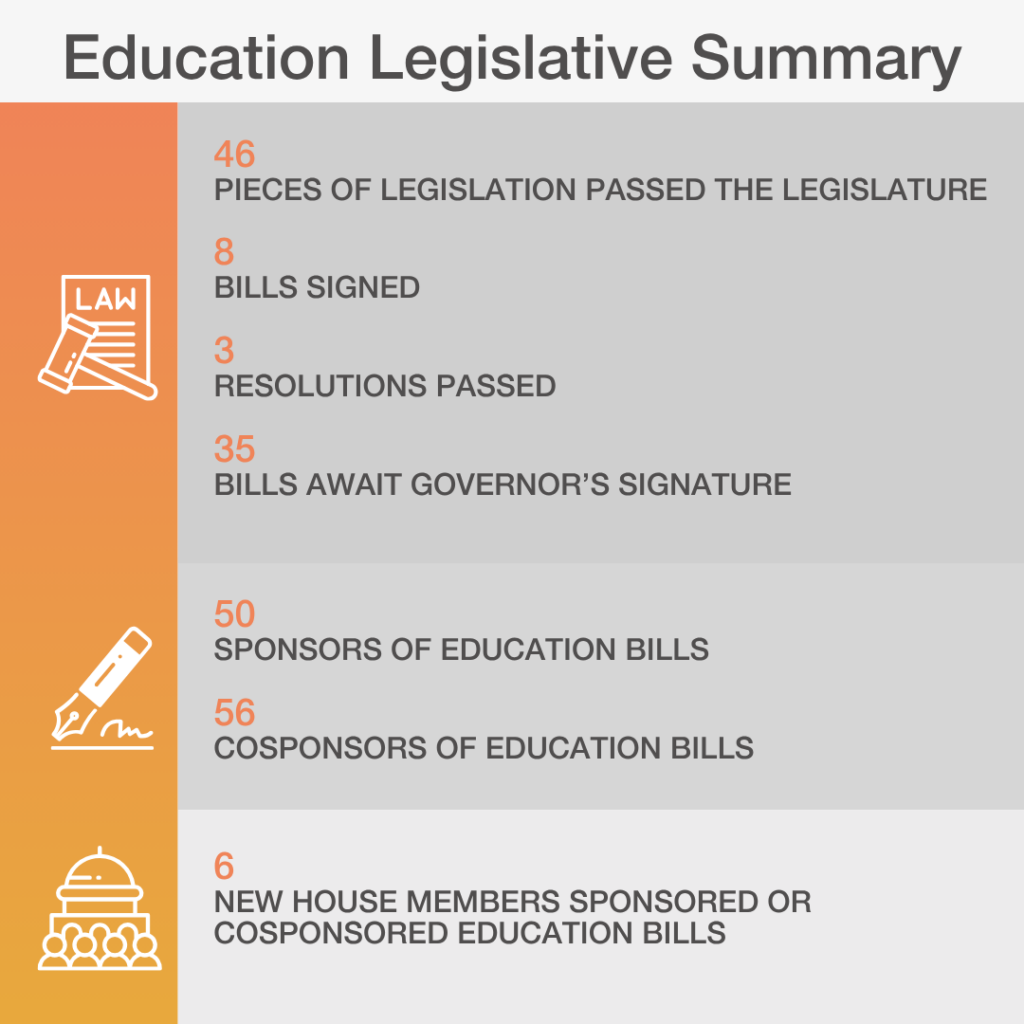First Legislative Session During Meyer Administration Prioritizes Literacy and Student Wellbeing

In a year of major transitions that featured a new governor and cabinet secretaries, new legislative leadership, and critical budget talks, Delaware education saw a somewhat muted legislative session when it came to education.
Gov. Matt Meyer and Sec. of Education Cindy Marten focused their first six months in office on building their teams and navigating the already-in-progress Public Education Funding Commission (PEFC). Gov. Meyer and the Joint Finance Committee also had to react to a turbulent federal landscape and the constant threat of funding and programmatic cuts from the federal government.
Gov. Meyer and Sec. Marten both responded strongly to Delaware’s lagging achievement scores on standardized tests—calling the situation a “literacy emergency.” Lawmakers weighed in on a diverse range of issues, from cell phone policies to free school lunches to school board governance.
Looking ahead, Delaware lawmakers will need to grapple with ongoing property value reassessments and equalization across property wealth and act on the October 1 recommendations of PEFC to help usher in a new school funding system.

Where the Budget Landed
The overall budget for the Delaware Department of Education (DDOE) grew by $232.3 million (an 11-percent increase) to a total of $2.39 billion, or around a third of the entire state budget.
Unlike recent years, there was not a significant investment this year in early care and education. There were, however, smaller signs of progress. That included raising the “exit” eligibility level for families receiving the Purchase of Care subsidy. Families who enter at 200 percent of the Federal Poverty Level ($60,000 for family of four) or below can stay until they reach 300 percent ($90,000 for family of four) for another year; and families can only qualify if their income is up to 200 percent.
Similarly, the state increased the eligibility entry point for its state-funded pre-K program to 200 percent of the Federal Poverty Level (it was previously set at 150%).
The state also committed to funding and building a data system for licensing and professional registry—committing $1.7M in the budget—as well as utilizing existing funding sources to add 100 seats to its pre-K program.
When it came to addressing Delaware’s “literacy emergency,” Gov. Meyer set aside $8 million that will support, as he said during his State of the State address, “measurable, intelligent, and targeted literacy interventions.”
Lawmakers also earmarked $3.5 million in the budget to support a universal breakfast program for all Delaware students.
For Delaware’s two notable college scholarships that provide free access to postsecondary options, lawmakers grew the SEED scholarship pot to $18.5 million (a $1 million increase), and the Inspire scholarship to around $13 million (a $2.4 million increase).
The governor also set aside one-time budget dollars for:
- School Cell Phone Pilot: $250,000
- Teacher-Driven Projects: $3 million
- Student Discipline Program: $2 million
- School-Based Intervention Services Pilot Program: $1 million
- Early Childhood System Updates: $1.7 million
All told, the 153rd General Assembly considered the following legislation. As this was the first half of the session, any bills that didn’t pass will carry over to the next session in January 2026.
Immigrant Students and Families
As headlines across the nation captured fear and anxiety around immigration and deportations, Delaware lawmakers focused a number of bills on protecting immigrant families and school communities. One bill, HB 182, which prohibits law-enforcement agencies from entering into agreements with federal immigration enforcement authorities, passed both the House and Senate. Several other bills (below) were introduced and are awaiting further consideration by the legislature.
HS 1 for HB 94 would prevent state law enforcement cooperation with federal immigration enforcement at schools, churches, and hospitals. This legislation would effectively reinstate and codify “safe spaces” protections similar to those supported under the Biden Administration, with some additional clarity and limits. The bill would explicitly extend protections to healthcare facilities, alongside child-serving entities and places of worship. Another bill, SB 78, would prohibit discrimination in schools.
HB 58 would prohibit law enforcement from stopping, arresting, or detaining individuals based solely on immigration status or civil immigration warrants, while HB 93 w/ HA 1, if passed in the second part of session next year, would prohibit school resource officers and school constables from assisting in immigration enforcement without the attorney general’s approval.
Another bill, HB 95, seeks to prohibit the sharing of student data with immigration enforcement via DDOE, schools, and vendors, unless there is explicit approval from the attorney general. Additionally, HB 96 would enact quarterly reporting requirements on federal immigration requests to state law enforcement, especially those involving schools, student data, or churches. HB 60 would restrict immigration status reporting via DMV.
To ensure the educational needs of migrant students are being met, HB 44 would establish a program that codifies existing services to guarantee that they continue.
Student and Family Wellbeing Front and Center
Several bills promoted access to school-based mental health services, financial literacy, and library freedom, showing a commitment to whole-child and inclusive learning environments.
HS 1 for HB 203 w/ SA 1 requires Delaware high schools to offer a half-credit financial literacy course covering various topics. It further requires that students pass this course to graduate, starting with students entering grade nine in the 2026-27 school year. This issue has been raised in every session over the last three years, with the loudest proponents being students and families themselves. Delaware now joins 21 other states that have enacted financial literacy requirements as of May 2023.
Echoing national conversations on religious and political expression, HB 119 w/ HA 1, HA 7, HA 8 protects access to library materials and bans censorship of reading materials based on political or religious views.
HB 149 authorizes the Division of Public Health to approve clinical training for mental health providers in school-based health centers, while SB 107 enacts the Interstate Compact for School Psychologists. HS 1 for HB 47 w/ HA 1 requires private schools and youth camps to conduct fingerprint-based background checks for employees, contractors, and volunteers.
SJR 11 w/ SA 1 establishes the Juvenile Justice Educational Transitions Task Force to propose a plan to ensure more successful transitions of youth from Delaware’s secured post-adjudicatory residential placement back into middle school or high school, including consideration of a new educational facility specifically targeted at transition of those youth.
For schools that accept “Title IX” federal funding to ensure students, staff, and faculty are protected from sex-based discrimination and sex-based harassment, SB 91 w/ HA 1 is a move toward greater transparency, requiring schools to clearly share Title IX information online.
HS 1 for HB 91, which gained headlines after appearing before the legislature in recent years, expands free school breakfasts to all students in participating schools regardless of income, with state reimbursement beginning July 1, 2025, but does not change eligibility for free lunch.

Regulatory Issues Surface for Early Learning
Early learning was another key area of focus. A handful of bills passed both the House and Senate. This includes HS 1 for HB 15 which, in response to the urging of early learning educators, supports play-based learning from pre-K to 2nd grade, allowing for related professional development, and gives DDOE authority to set ongoing regulations. Simultaneously, SR 14 directs DDOE to review Delaware’s kindergarten assessments and readiness data processes and publish a report with findings and improvement recommendations by May 1, 2026. HR 14 continues the commitment to report out data and identify underspent resources by directs the Department of Health and Social Services (DHSS) to prepare reports on the Purchase of Care subsidy program.
Further, to ensure health, safety, and child development standards are met on a consistent basis, lawmakers passed HS 1 for HB 47 to tightens background checks by closing loopholes for private schools and camp, while HS 1 for HB 49 requires early education programs run by state or local education agencies to submit to a parallel regulatory and monitoring structure administered by the Office of Child Care Licensing. HB 121, meanwhile, exempts military-certified child care providers serving only Department of Defense-eligible children from state licensing.
Finally, there was one early childhood bill that was introduced but requires further action when the legislature reconvenes next year: HS 1 for HB 204. This bill would create a Child Care Complaint Investigation Unit within DDOE to respond to complaints about licensed child care providers.
Supporting the Teacher Workforce
Several bills addressed teacher salaries, licensure, preparation pathways, and paraprofessional roles—pointing to a strong legislative focus on educator retention and support.
SB 81 w/ SA 1, SA 2 allows all teachers and specialists—regardless of hire date—to receive additional experience credit toward their salary. HB 97 w/ HA 1 creates a new permit requirement for paraprofessionals and other student-facing roles, ensures only licensed or permitted staff work with students unsupervised. SB 52 makes it easier for retired public employees to return to work—especially as substitute teachers—by removing the earnings cap, shortening the separation period, and allowing charter schools to hire them under the same rules as districts.
SB 187 consolidates three separate student loan repayment programs for public school employees into one streamlined stipend program, changing payments from direct-to-lender to direct-to-employee to reduce tax issues and administrative burden.
HB 51, which unlike the other bills discussed in this section up until this point did not make it through the House and Senate, expands the Delaware Educator Apprenticeship Program to include paraprofessional and high school youth apprenticeships and requires DDOE and the Delaware Department of Labor to launch a pilot and seek funding for the 2025–2026 school year. However, the state did receive federal resources to support educator apprenticeships, and the DDOE and DDOL intend to proceed growing and launching these programs.
Additionally, in a move to strengthen the “grow your own” educator pipeline, HB 12 was introduced. It would create a $2,500 scholarship for students who completed a Delaware Teacher Academy and are in their first year of a Delaware educator preparation program, with up to 35 awards and potential expansion based on interest and funding. Both of these bills will have another chance to be heard when the General Assembly reconvenes in January.

Push for Transparency, Governance, and Community Engagement
Following several newsworthy controversies involving school board members, new bills this session tackled school board training, public access to meetings, and stricter eligibility for board service—suggesting a push for stronger school governance accountability.
HB 64 w/ HA 1 requires school board meetings to offer remote access. To guide better decision-making for school communities, HB 29 updates and codifies current practices for how the Delaware Department of Education publishes school performance data.
HB 77 requires school board and charter board members to receive training on best practices and legal requirements of school boards. HB 82 requires school board members to live and physically reside in the district they represent for at least 75 percent of the year.
HB 38 ensures public officials working at publicly funded colleges are not shielded from standard record-keeping requirements, reinforcing state oversight. HB 79 w/ HA 2 requires additional reporting and disclosure related to the use of mechanical restraint and seclusion in public schools.
One additional bill, HB 78—which will require further action by the legislature during the second part of session—would require public bodies, including school boards and higher education boards, to post digital recordings of meetings online within seven business days.
Youth Empowerment and Civic Participation. From volunteerism credits to paid apprenticeships, lawmakers elevated ways youth can engage in shaping their communities and futures. Specifically, HB 171, which passed both chambers, adds an elective credit for volunteering with local fire department.
These Bills Also Passed
- SB 90 augments the Inspire Scholarship Program at Delaware State University by allowing students who complete a bachelor’s degree in less than eight continuous semesters to use the remaining Inspire grant money towards a graduate degree program at DSU.
- HB 159 gives a county, upon a county-wide reassessment of real property under § 8306(b) of Title 9, the authority to adopt an ordinance modifying the school property tax exemption amounts that were put in place on or before January 1, 1998.
- HB 11 aligns state special education law with the Individuals with Disabilities Education Act, and its implementing regulations, and clarifies that a parent’s representative may obtain copies of a student’s special education records.
- SB 48 w/ SA 1 + HA 2 adds intentional interference with school bus operations—such as refusing to exit, obstructing movement, or threatening passengers—to the crime of disorderly conduct.
- SB 160 requires DHSS and DDOE, to post Type 1 diabetes materials online and schools to share them with parents or guardians.
- SCR 109: This resolution directs state agencies to evaluate and report on how Delaware Pathways can support careers in the creative economy.
- SCR 91 directs the Delaware Interscholastic Athletic Association (DIAA) to analyze five years of data on public vs. private school championship outcomes and recommend policies to promote fairer competition by April 30, 2026.
- SJR 5: This resolution directs the Department of Health and Social Services to raise Medicaid Long Term Services and Supports eligibility to 300 percent of Supplemental Security Income (SSI), aligning Delaware with other states.
These Bills Were Introduced and Await Further Action
- SB 106 w/ SA 2: requires each Delaware school district and charter school to adopt and post a cell phone use policy—with educator input—by August 1, 2025, outlining clear rules, limits, and exceptions.
Related Topics: career pathways, Delaware education, Delaware legislature, early childhood education, legislative session, pre-k, teacher support